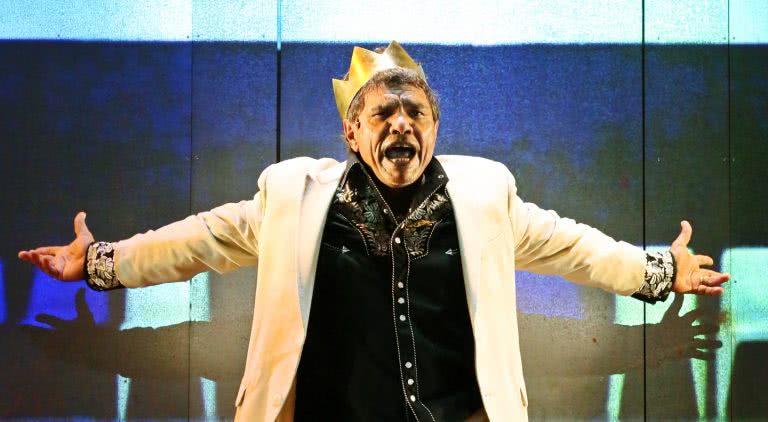Michael Kantor’s do-over of King Lear at Carriageworks recasts the play as a story of warring families in remote indigenous Australia. Kantor transforms the barn-like Bay 17 into the red desert and, supported by the irrepressible Tom E. Lewis in the title role, embarks on a contemporary discussion of property rights. The idea of land ownership as a central theme is a hefty challenge for a director to set himself, and an interesting take on the Bard’s original themes of family and power.
Kantor is faithful to the basic plot of Lear, but hardly reverential, and the production both fires and falters on Kantor’s approach. There’s a healthy dose of humour, especially early on, that one doesn’t expect to see in Lear, and the actors jump spryly from the original text to contemporary colloquialisms – Goneril and Regan object to their dad’s ‘mob’ parking themselves out back. It can sometimes be an awkward fusion; vaudeville ockerisms tossed in with Shakespeare’s language as well as chunks of the Kriol and Yolngu Matha dialects, but the actors pull it through. Lewis is charismatic and virile as Lear, far more imposing and vigorous than most iterations of the character. There’s a tensile strength to him that makes his eruptions of rage physically frightening. AndJimi Bani,Jada Albertsand the rest of the cast hold up their roles just as strongly.
Kantor has said that the idea for this production came when Lewis told him of disputes over mining royalties in his hometown of Katherine. This production, for Kantor, is a chance to explore our relationship to the land. The folly of Lear’s pride is, therefore, less emphasized. The central preoccupation with the folly of property, and its corrosive effects on family is foreshadowed early on. “Where there’s a will,” an elder tells us, “There’s relatives.”
3.5/5 stars
The Shadow King played at Carriageworks as part of Sydney Festival 2014.


































